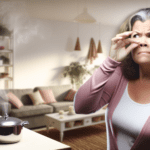Introduction to Olfaction and Menopause
The sense of smell, or olfaction, is a complex process that allows us to perceive, conduct, and recognize scents and odors. This intricate system is deeply interconnected with our limbic system and reticular formation, influencing a range of functions from visceral and vegetative regulation to sexual behavior. Olfaction not only contributes to our ability to enjoy flavors and fragrances but also plays a pivotal role in creating emotions and adjusting our visceral and vegetative responses to emotional states.
The Connection Between Olfaction and Overall Health
Olfaction is not merely about enjoying pleasant aromas; it is a critical component of our overall health. The olfactory system’s connections to higher cortical functions and the endocrine system underscore its importance in maintaining a balance within our bodies. A healthy sense of smell can alert us to dangers, enhance our food experiences, and even influence social interactions and intimate relationships.
Overview of Menopause and Perimenopause
Menopause is a natural phase in a woman’s life, marking the cessation of her reproductive capabilities, typically occurring between the ages of 45 and 55. Perimenopause is the transitional period leading up to menopause, where hormonal fluctuations begin to manifest as various physical symptoms. These hormonal changes, particularly the decline in estrogen and progesterone levels, have been shown to significantly affect olfactory abilities, leading to alterations in how women perceive and experience scents.
Purpose of the Article
The purpose of this article is to explore the nuanced relationship between menopause and changes in the sense of smell. As women navigate through perimenopause and menopause, they may encounter a range of olfactory changes, from diminished sensitivity to heightened awareness of odors. By delving into the biological mechanisms, hormonal influences, and the potential psychological and physiological effects, this article aims to provide a comprehensive understanding of these changes. Additionally, it will offer insights into natural management strategies and when to seek medical advice, empowering women to embrace these changes and seek balance during this transformative stage of life.
Biological Mechanisms of Smell
The Olfactory System Explained
The olfactory system is a sophisticated sensory mechanism that allows us to perceive and interpret a vast array of scents. At the core of this system are the olfactory receptors, which are specialized neurons located within the nasal cavity. These receptors bind to odorant molecules and initiate a cascade of neural signals that travel to the olfactory bulb. From there, the information is processed and relayed to various brain regions, including the olfactory cortex, which is responsible for identifying and distinguishing different odors. This intricate process enables us to experience the nuanced world of smells that enrich our daily lives.
How Smell and Taste are Interconnected
Smell and taste are intimately linked, with both senses contributing to the overall perception of flavor. The tongue can detect only five basic tastes: sweet, sour, salty, bitter, and umami. However, it is the olfactory receptors that provide the depth and complexity of flavors by capturing the aromatic compounds in food. When we chew, volatile molecules are released and travel through the retronasal passage to the olfactory receptors, enhancing our perception of taste. This interconnection explains why a loss of smell can lead to a diminished sense of taste, often impacting one’s appetite and enjoyment of food.
Common Causes of Olfactory Changes
Olfactory changes can arise from a variety of causes, ranging from natural aging to environmental factors. As we age, the number of functional olfactory receptors declines, leading to a gradual loss of smell. Other common causes include upper respiratory infections, head trauma, exposure to toxic chemicals, and certain medications. Additionally, conditions such as Alzheimer’s disease, Parkinson’s disease, and chronic sinusitis can also affect olfactory function. Understanding these causes is crucial for diagnosing and managing olfactory disorders effectively.
Hormonal Influence on Olfaction
Role of Estrogen and Progesterone in Smell
The sense of smell, or olfaction, is a complex process that is influenced by various factors, including hormonal changes. Estrogen and progesterone, two key hormones in female reproductive health, play a significant role in olfactory function. Estrogen is known to protect and nourish the nasal respiratory epithelium, which contains receptors for female hormones. Fluctuations in estrogen levels can therefore impact the ability to perceive and identify odors. During menopause, when estrogen levels decline, women may experience changes in their sense of smell, such as heightened sensitivity or a reduced ability to detect scents.
Progesterone, on the other hand, can make individuals more sensitive to certain smells, particularly those associated with fatty foods. This sensitivity is thought to be an evolutionary adaptation to help pregnant women avoid potentially harmful substances. However, during menopause, the decrease in progesterone levels may contribute to alterations in olfactory perception.
Research Findings on Olfactory Function and Menopause
Studies have shown a significant decrease in olfactory ability among postmenopausal women compared to their premenopausal counterparts. This decline is attributed to the decrease in sex hormone levels associated with menopause. For instance, research conducted at the Ear, Nose and Throat Clinic in Novi Sad using an olfactometer and the Fortunato-Niccolini method found that postmenopausal women exhibited a marked reduction in their ability to perceive and identify odors. Similarly, data from the Korean National Health and Nutrition Examination Surveys indicated that olfactory dysfunction was more prevalent among postmenopausal women, suggesting a link between hormonal changes and the sense of smell.
Understanding Anosmia, Phantosmia, Hyposmia, and Parosmia
Menopause can lead to various olfactory disorders, including anosmia (loss of smell), phantosmia (perception of phantom smells), hyposmia (reduced sense of smell), and parosmia (changes in how things smell). Anosmia may occur when the olfactory receptors or the olfactory nerve is affected, potentially due to hormonal imbalances. Phantosmia can be particularly distressing, as individuals may smell odors that are not present, often unpleasant ones. Hyposmia involves a decreased sensitivity to odors, which can diminish the enjoyment of food and affect quality of life. Parosmia is characterized by a distortion of odors, where familiar scents may become foul or unrecognizable.
These conditions can have a significant impact on well-being and daily life. Understanding the symptoms and seeking appropriate medical advice is crucial for managing these olfactory changes during menopause.
Symptoms and Effects of Olfactory Changes During Menopause
Dry Mouth and Its Impact on Smell and Taste
During menopause, hormonal fluctuations, particularly the decline in estrogen, can lead to a reduction in saliva production. Saliva is essential for the initial breakdown of food into chemicals that our taste buds can detect as flavors. With a decrease in saliva flow, women may experience a diminished sense of taste, often described as a change or reduction in flavor intensity. This condition, known as dry mouth, can also affect the mucous membranes, leading to altered taste sensations. As taste and smell are intricately connected, a dry mouth can indirectly impair olfactory function, making it challenging to enjoy the full range of scents and tastes that contribute to the quality of life.
Hyperosmia: Heightened Sensitivity to Smells
Some women going through menopause may develop hyperosmia, an increased sensitivity to odors. This heightened awareness can make previously pleasant scents overwhelming or even unbearable. Factors such as hormonal changes and migraines, which are more common during menopause, can trigger this response. Hyperosmia can also influence taste, as strong odors may alter the perception of food flavors, leading to a disinterest in eating or an aversion to certain foods.
The Psychological Impact of Olfactory Alterations
The changes in olfactory function during menopause can have a significant psychological impact. The sense of smell is closely linked to emotional memory and mood regulation. Alterations in the ability to detect or enjoy familiar scents can lead to feelings of frustration, sadness, or a sense of loss. These emotional responses can be compounded by other menopausal symptoms, such as mood swings or depression, creating a challenging cycle that affects overall well-being. It is important for women to recognize these changes and seek support to manage the psychological effects of olfactory alterations during menopause.
In conclusion, menopause can bring about various changes in olfactory function, from dry mouth affecting taste and smell to hyperosmia increasing sensitivity to odors, and the psychological effects that accompany these changes. Understanding these symptoms and their impact is crucial for managing and adapting to the new sensory experiences during this phase of life.

Bette 100% All-Natural Relaxing Lavender Body Lotion.
Chemical-Free
Your relaxing night time body moisturizer to leave the day’s stress behind. Decompress and wish your body good night with the calming scent of lavender.
Natural Management of Olfactory Changes
Hydration and Its Effects on Olfactory Health
Hydration plays a crucial role in maintaining the health of the olfactory system. Adequate fluid intake ensures that the mucous membranes in the nose remain moist, which is essential for the proper functioning of the olfactory receptors. During menopause, women often experience dry mouth due to hormonal changes, which can lead to a decrease in saliva production. Saliva is not only vital for dental health but also for initiating the breakdown of food into chemicals that can be detected by taste buds. Therefore, staying well-hydrated can help mitigate some of the olfactory and taste changes experienced during menopause.
Dietary Considerations and Smell Sensitivity
Menopause can alter a woman’s sensitivity to smells, making certain foods less appealing or even unpalatable. To manage these changes, dietary adjustments can be beneficial. Foods that are overly spicy, hot, salty, or acidic may exacerbate dehydration and irritation in the mouth, potentially impacting smell and taste. Conversely, a balanced diet rich in zinc and vitamin D may support olfactory health. Avoiding irritants such as alcohol and caffeine, which can dry out the mouth, is also recommended.
Nasal Irrigation and Smell Training Techniques
Rinsing the nasal passages with a saline solution can help remove allergens and cleanse the nasal passages, potentially improving the sense of smell. This can be done using a neti pot or similar device. Additionally, smell training has emerged as a technique to enhance olfactory function. It involves actively sniffing a set of distinct scents daily, such as rose water or cinnamon, to stimulate the olfactory system. This practice can be particularly helpful for those experiencing anosmia or hyposmia.
When to Consider Professional Help
While natural management strategies can be effective, it’s important to recognize when professional help may be needed. If olfactory changes persist or significantly impact quality of life, consulting a healthcare provider is advisable. They can check for underlying conditions such as polyps or sinus infections that may be contributing to olfactory issues. In some cases, hormonal therapies or other medical interventions may be appropriate to address the changes in smell associated with menopause.

Popular Read
When to Seek Medical Advice
Identifying Persistent Olfactory Issues
Changes in olfactory function can be a natural part of aging or a consequence of hormonal shifts during menopause. However, when changes in your sense of smell become persistent or significantly impact your quality of life, it’s important to seek medical advice. Persistent olfactory issues may include a reduced ability to smell (hyposmia), the perception of smells that aren’t present (phantosmia), or a distorted sense of smell (parosmia). If you notice that these changes do not improve over time, or if they are accompanied by other symptoms such as a persistent dry mouth or altered taste, consulting with a healthcare professional is recommended.
Possible Medical Interventions
Upon consulting a healthcare provider, several interventions may be considered. These can range from lifestyle modifications such as improving dental hygiene, staying hydrated, and avoiding irritants like tobacco smoke, to medical treatments including nasal irrigation or smell training techniques. In some cases, hormone replacement therapy (HRT) may be discussed as a potential method to alleviate menopause-related symptoms, although its effectiveness for olfactory changes specifically requires further research. Additionally, if an underlying condition such as a sinus infection or nasal polyps is identified, appropriate treatments will be prescribed.
Understanding When Changes May Be Permanent
While many olfactory changes during menopause are temporary, it’s crucial to understand that some alterations may be permanent. Factors such as the natural decline in estrogen levels and the cumulative effects of environmental exposures over time can lead to lasting changes in olfactory function. Recognizing and accepting these changes can be an important step in adapting to a new normal. However, ongoing communication with healthcare professionals can help manage expectations and explore all available options for maintaining olfactory health and overall well-being.
In conclusion, if you experience persistent changes in your sense of smell during menopause, do not hesitate to seek medical advice. Early intervention can help address any underlying issues and improve your quality of life. Remember, you are not alone in this transition, and support is available to help you navigate these changes.

From unhappy, dry, and sandpaper to silky, smooth and feeling good. That’s Cleo. Cleo is a 100% natural labial balm to moisture and soothe “your other lips”. Cleo is chemical-free, water-free, pH optimized and helps maintain and restore your delicate labial skin’s natural flora. Ideal for daily use or as needed. Get the most silky, lovable lips ever.
Conclusion: Embracing Change and Seeking Balance
Summarizing the Impact of Menopause on Olfaction
Menopause, a natural transition in a woman’s life, brings about a myriad of changes, including alterations in olfactory function. The decline in estrogen and other hormonal fluctuations can lead to a heightened sensitivity to odors, known as hyperosmia, or to a reduced ability to detect scents, known as hyposmia. These changes in olfaction can affect daily life, influencing everything from dietary preferences to social interactions. Understanding the biological underpinnings of these changes is crucial for women navigating this stage of life.
The Importance of Awareness and Proactive Management
Being aware of the potential olfactory changes during menopause is the first step towards proactive management. Women experiencing these changes can benefit from lifestyle adjustments, such as avoiding strong odors and maintaining good nasal hygiene. Additionally, seeking professional advice when necessary can provide further strategies for managing symptoms. It is also important for healthcare providers to recognize and address these changes, offering support and understanding to women during menopause.
Final Thoughts on Navigating Olfactory Changes
Navigating olfactory changes during menopause can be challenging, but it also presents an opportunity for growth and adaptation. By embracing these changes and seeking balance through awareness, lifestyle modifications, and professional support, women can continue to enjoy a rich sensory experience. It is essential to remember that while menopause may bring about a shift in olfactory perception, it also marks the beginning of a new chapter in life, one that can be approached with positivity and resilience.








